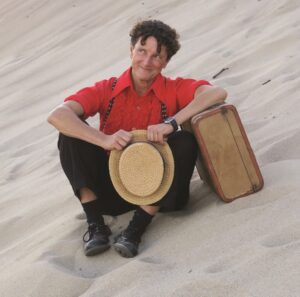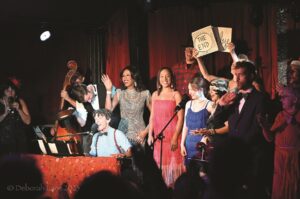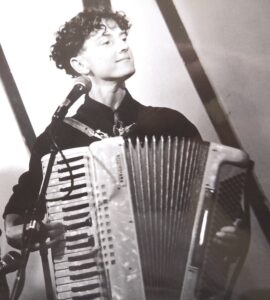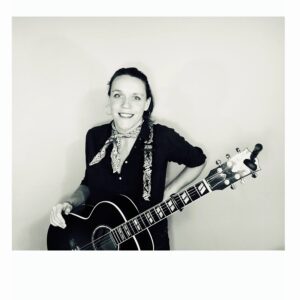Singer, songwriter, and storyteller Zoë Lewis first came to Provincetown when she was 26. It was the early 1990s, and she’d been all around the world, and, in a spirit of adventure, had left hundreds of places behind, always moving forward. But Lewis, a romantic and a self-proclaimed washashore, fell in love with the town.

“I need to be in a place where the buildings are old,” she says. “Driving across America, you could be anywhere on the freeway. There’s a McDonald’s, there’s a Burger King, there’s a strip mall. Everything’s the same.”
In Provincetown, with its steadfast architecture and its narrow, personable streets, Lewis felt charmed. Here, she says, “there are a million stories to be found and a million songs to be written.” And Provincetown reminded her of the place where she grew up: Rottingdean, a seaside village on the English Channel that attracted artists and writers in the 19th century. Rottingdean is next to Brighton — “the gayest place in England, really,” says Lewis. “But I didn’t know that growing up.”
Lewis did know music in those early years, but she had to create it for herself. Her parents were older — her mother, who called herself tone-deaf, had Lewis when she was 51. When she arrived on the scene, Lewis was already an aunt — to her 19-year-old sister’s child. She had an even older brother. “I was the accident at the end,” says Lewis. “My mother prayed for someone who could sing to her.” With no piano in the house, Lewis found pots and pans to drum on. When she was 13, the family did get a piano, but Lewis still “played music on everything” — a trait that ultimately led to her being described as “a band in a body.”
“I guess I grew up with old ladies and cups of tea,” says Lewis. Because her parents were older, “they had the old records — the old tunes.” In the 1920s, says Lewis, “the music was great, and it was free, with the flappers, and it was gay, and it was ‘anything goes.’ It swings, and it’s funny, and romantic, like a black-and-white movie.” It seems to go without saying, but Lewis says it anyway: “I embrace all of that.”

Lewis will perform four shows — different shows for her “different loves” — for Provincetown’s Women’s Week this year: the first, “Songs in the Key of Z” at the Post Office Café on Sunday, Oct. 8, will be followed by a collaboration with Lucy Wainwright Roche on Monday, Oct. 9 at the Unitarian Universalist Meeting House, a 1920s speakeasy night with her band the Bootleggers at the Red Room on Thursday, Oct. 12, and finally a concert at the Unitarian Universalist Meeting House with Catie Curtis on Saturday, Oct. 14.
“Songs in the Key of Z” is a “tea-time show,” says Lewis, in which she’ll sing and play the piano, guitar, ukulele, and harmonica, and take listeners “on a travel adventure through songs.” She’s been to more than 70 countries and written prose and lyrics about her travels for years. She has 10 albums of original material.
“I’m always sitting places with my little notebook,” she says. On Sunday, she might tell stories about jumping freight trains up and down the West Coast. “I could tell you stories about my first time drinking tequila in Mexico,” she says. “I could tell you about the gig that I had when a baby goat was born, and I had to jump offstage and cut the umbilical cord.

“I’ve got so many stories about the characters I’ve met along the way,” she continues. “The Prince of Love, the Voodoo prince who blessed me with love for the rest of my life for $5 in New Orleans. My own landlady in Provincetown, who gave me a rent of $500 a month and would tell me about the lesbian bar, the Ace of Spades, across the way, how it used to be when she first came to town.”
Lewis says she would like to write a book one day, but for now, songs do the storytelling just fine. “People tell me sometimes that my songs are like photos,” she says. “Very visual, I suppose.”
For Women’s Week, Lewis says she likes to bring in new people to perform alongside and also those with whom she can “share the magic” of Provincetown. Opening for the Indigo Girls when they first came to Provincetown, Lewis met Roche, who often opens for them. The two shared a microphone and sang “Closer to Fine.”
Roche’s mother is Suzzy Roche of the vocal trio The Roches, and her father is Loudon Wainwright III. “They’re all folk royalty,” says Lewis. While Lewis grew up with “no music at all” around her, Roche grew up “totally ensconced in it.” They clicked.

Catie Curtis is an older friend. They met “back in the day,” says Lewis, when she first came to the U.S. “We were just running around with our guitars, playing shows.” Curtis, like Lewis, tells stories through her songs. “That’s the folk sensibility,” says Lewis. “She’s a brilliant singer-songwriter.”
Lewis may feel most free in her Speakeasy show at the Red Room, which she’s done for 10 years. “We take you back in time to the ’20s,” she says. “Everyone dresses up.”
With a swinging jazz band and a shifting ensemble of talented locals and celebrities, Lewis plays pretend. “We have hats and tails, we have boaters, we have flapper girls, and we have props. We have snakes in baskets. We have boats, we have moons on sticks. We even have waves, where people can swim behind them.” Using her hands to create things is “beautiful, it’s alive, it’s tactile. We need it,” says Lewis. “We forget that. It’s like gardening, or like putting your hands in the earth or the sea.
“I believe in magic,” says Lewis. “Life is crazy, and it’s terribly hard out there. I feel it’s my job to sprinkle a bit of joy on people.” The sentiment comes from her close friend, the Provincetown artist, teacher, and cabaret singer Ilona Royce Smithkin, who died in 2021 at 101. Smithkin came to Provincetown in the ’50s by train, says Lewis. “Ilona dressed wildly,” she says. “She was a magic lady.” She would cut her hair and stick long pieces to her eyelashes. Lewis wrote a song about her, called “Eyelashes.”
“She was my muse,” says Lewis.

The two performed together frequently. Lewis recalls one show. “She was probably in her 80s,” she says. “We were going to do three songs. She turned up with three different outfits on top of each other and she peeled them off. There were boas and sequins and high heels and fishnet stockings. On the last song, she jumped in the air and then went down into a complete split.”
Smithkin knew great hardship in her life, but she wrote two books, one called Joy Dust. “She sprinkles the dust of joy on people,” says Lewis. “Yet she escaped Nazi Germany.”
Lewis has recorded a new album, to be released next year, called Blink. It’s inspired by something Lewis remembers Smithkin saying: “Don’t blink too much in life. One blink and you’ll miss it.” A telling statement, says Lewis, coming from someone with crazily long eyelashes.
Lewis says she feels powerful when she gets onstage. “It’s about grabbing life, you know?” she says. “You can make people laugh; you can make people cry.” She loves Charlie Chaplin, she says, because he’ll make her crack up, but he also can break her heart. That’s what she’s trying to do with her music, she says, “for the children of all ages inside all of us.”
Don’t Blink
The events: Four different Women’s Week shows by Zoë Lewis
‘Songs in the Key of Z’: Sunday, Oct. 8, 4 p.m.; Post Office Café & Cabaret, 303 Commercial St., Provincetown; general admission, $25
In Concert with Lucy Wainwright Roche: Monday, Oct. 9, 6 p.m.; Unitarian Universalist Meeting House, 236 Commercial St., Provincetown; general admission, $32
1920s Speakeasy Night with the Bootleggers: Thursday, Oct. 12, 8:30 p.m.; Red Room, 258 Commercial St., Provincetown; general admission, $25
In Concert with Catie Curtis: Saturday, Oct. 14, 8 p.m.; Unitarian Universalist Meeting House; general admission, $32
